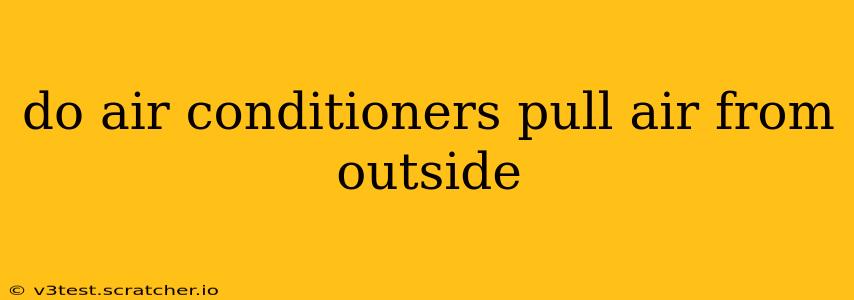Do Air Conditioners Pull Air From Outside? Understanding How AC Units Work
The short answer is: Yes, most air conditioners pull air from outside. This is a fundamental aspect of how they function to cool your indoor space. However, there's more to the story than a simple yes or no. Let's delve into the specifics.
How Does an Air Conditioner Work? The Basics
Air conditioners work on a principle called the refrigeration cycle. This involves four key components:
-
Evaporator Coil: This coil is located inside your home. Refrigerant flows through it, absorbing heat from the indoor air. This makes the air cooler, which is then circulated throughout your house via your home's ventilation system.
-
Compressor: This powerful component compresses the refrigerant, raising its temperature and pressure.
-
Condenser Coil: Located outside your home, this coil releases the heat absorbed from your indoor space into the surrounding air. This is why the outside unit of your air conditioner gets hot.
-
Expansion Valve: This valve regulates the flow of refrigerant, allowing it to cool down and begin the cycle again.
The entire process relies on the continuous circulation of refrigerant and the transfer of heat from the inside to the outside. This transfer requires the intake of outside air into the condenser unit to facilitate the heat dissipation process.
What Kind of Air Do AC Units Pull in?
Air conditioners don't just pull in any outside air. The outdoor unit is designed with filters and vents to minimize the intake of large debris, insects, and other unwanted particles. However, it's important to note that some smaller particles and pollutants will inevitably be drawn in. Regular maintenance and cleaning of your outdoor unit are crucial to ensure efficient operation and prevent the accumulation of dirt and debris that could restrict airflow.
What About Window AC Units?
Window air conditioners operate on the same fundamental principles. They draw warm, humid air from inside the room, cool it, and then expel the heated air outside through the other side of the unit. The process of pulling in outside air is slightly different; the warm air is drawn in through the inside of the unit and the cool air is blown into the room while simultaneously exhausting the warmer air outside. The overall effect is the same – cooling your interior space by transferring heat to the outside environment.
Can Air Conditioners Work Without Outside Air?
No, standard air conditioners cannot operate without pulling in outside air. The condenser coil needs this outside air to efficiently dissipate the heat absorbed from the inside of your home. Without this heat exchange, the system would overheat and eventually shut down.
What are the Different Types of Air Conditioners?
Several types of AC systems exist, each with varying functionalities:
-
Central Air Conditioning: This system uses a network of ducts to distribute cooled air throughout a building. These systems invariably pull air from outside.
-
Window Air Conditioners: These are self-contained units installed in windows and pull air from both inside and outside the building.
-
Portable Air Conditioners: While portable units generally exhaust warm air through a hose that can be vented out a window, they still rely on the exchange of indoor and outdoor air to function effectively.
What if My AC Isn't Pulling Air From Outside?
If your air conditioner seems to be malfunctioning or not pulling air from outside as it should, it's crucial to contact a qualified HVAC technician for inspection and repair. Ignoring such issues could lead to reduced efficiency, overheating, and potential damage to the system.
By understanding how air conditioners work and the role of outside air, you can better maintain your system and ensure it provides optimal cooling throughout the year. Remember regular maintenance is key to the long-term performance of your AC unit.
